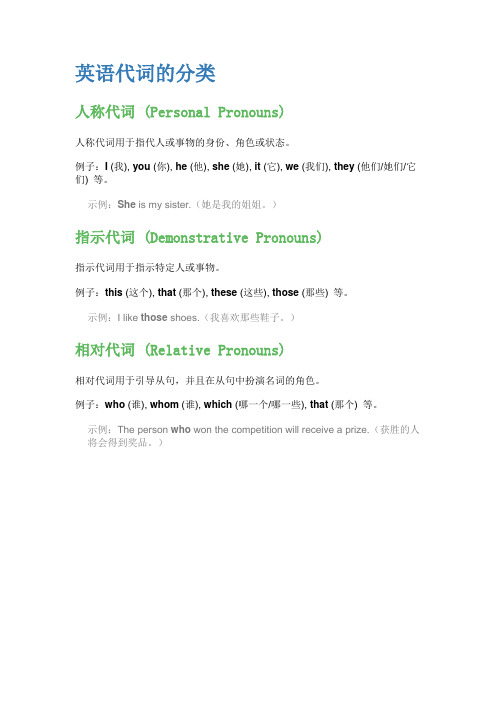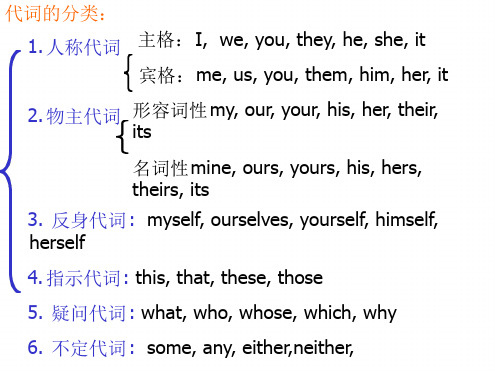英语代词分类
英语代词分类

初中英语代词分类三、代词:1、代词的分类:英语中代词分为:人称代词、物主代词、反身代词、指示代词、关系代词、疑问代词、连接代词和不定代词等等.2I o s。
(星期天我常去购物) / Are they fro m Br azil?(他们是巴西人吗?) / Where have they gon e?(他们上哪儿去了?) / T hat's i t.(就那么回事) / It's he !(是他!)2、宾格用来作及物动词或者介词的宾语.如:Who teach es you E ng lish this y ear ?(今年谁教你们的英语?) / Help me !(救救我!) / We of ten w rit e lette rs to her 。
(我们常给他写信)3、人称代词作表语或者放在比较状语从句连词than 或as 之后时,可以用主格形式,也可以用宾格形式,口语中大多用宾格。
如:——W ho is it?(是谁?) –It’s I/me 。
(是我。
)4、 三个不同人称同时出现,或者主语中包含“我”时,按照“you→he →I"的顺序表达。
如:Bo th he and I ar e working at th at com put er c ompa ny 。
(我和他都在那家电脑公司上班) –Who wi ll g o there ?(谁要去那儿?) –You and m e.(你和我)5、 人称代词it 除了可以指人指物之外,还可以表示“时间、天气、温度、距离、情况”等含义,此外还可以作“非人称代词"使用,替代作主语或者宾语的不定式、动名词或者名词性从句。
如:——What’s t he weather lik e toda y?(今天天气怎样?)-I t’s fine.(天气晴好) / --W ha t’s th e t ime?(几点啦?) –It ’s 12:00。
英语代词分类

初中英语代词分类三、代词:1、代词的分类:英语中代词分为:人称代词、物主代词、反身代词、指示代词、关系代词、疑问代词、连接代词和不定代词等等..21I often go shopping on Sundays.物/ Are they from Brazil 他们是巴西人吗/ Where have they gone 他们上哪儿去了/ That’s it.就那么回事/ It’s he是他2、宾格用来作及物动词或者介词的宾语..如:Who teaches you English this year 今年谁教你们的英语/ Help me救救我/ We often write letters to her.我们常给他写信3、人称代词作表语或者放在比较状语从句连词than或as之后时;可以用主格形式;也可以用宾格形式;口语中大多用宾格..如:--Who is it 是谁–It’s I/me.是我..4、三个不同人称同时出现;或者主语中包含“我”时;按照“you→he→I”的顺序表达..如:Both he and I are working at that computer company.我和他都在那家电脑公司上班–Who will go there谁要去那儿–You and me.你和我5、人称代词it除了可以指人指物之外;还可以表示“时间、天气、温度、距离、情况”等含义;此外还可以作“非人称代词”使用;替代作主语或者宾语的不定式、动名词或者名词性从句..如:--What’s the weather like today 今天天气怎样—It’s fine.天气晴好/ --What’s the time 几点啦–It’s 12:00.12点/ It’s a long way to go.那可要走好长的路/ It took him three days to clean his house.打扫屋子花了他三天的时间/ Itis very clear that the public want to know when these men can go into space.很显然;公众想知道这些人什么时候能进入太空/ We found it very difficult to learn aforeign language well.我们发觉要学好一门外语是非常困难的3Is that your umbrella 那是你的伞吗/ I often go to see my aunt on Sundays.我经常在星期天去看望阿姨/ They are their books.是他们的书2、名词性物主代词相当于名词;既代替事物又表明所属关系;在句子中往往独立地作主语、宾语或者表语;后面千万不可以跟名词..如:This is your cup;but where is mine 这是你的杯子;可我的在哪儿 / Y our classroom is very big; but ours is rather small .你们的教室很大;我们的相当小3、“of + 名词性物主代词”称为双重所有格;作定语时放在名词的后面..如:A friend of mine came to see me yesterday .我的一个朋友昨天来看我了 指若干朋友中有一个来看我..试比较 My friend came to see me yesterday .我的朋友昨天来看我了指我的那个特定的朋友来看我..4Don’t play with the knif e; you might hurt yourself.不要玩刀子;那会割伤你的2、在句子中作同位语表示强调即用来强调名词或代词的语气..如: The story itself is good. Only he didn’t tell it well.故事本身是好的;只是他没有讲好6..What’s this 这是什么 / That model plane is made of plastic.那只模型飞机是塑料做的被动句 / Remember never to do such things.记得永远不要做这样的事情 / Do the same as the teacher tells you. 按老师说的做/ ---Who is it 是谁 ---It’s me 是我6、关系代词:用来引导定语从句的代词叫关系代词;参见后面的定语从句..1、关系代词who 、which 、 that 、whom 等;将定语从句和主句连接起来..英语中的关系代词一方面在从句中担任一定的成分;另一方面又起连接作用..如:The student who is drawing a picture is in Grade One.正在画画的学生是一年级的2、关系代词who / whom 指人;如果作从句的宾语;则有时省略..如:Do you know the man who is wearing a red hat 你认识那个戴着红帽子的男人吗3、关系代词which 指物;如果作从句的宾语;则有时省略..如:Have you found the bookwhich you lost several days ago 你找到几天前丢失的那本书了吗4、关系代词that 既可指人也可指物;如果作从句的宾语;则有时省略..如:Can you see theman/dog that is running along the river bank 你看得见顺着河跑的男人/狗了吗7、连接代词:用来引导宾语从句、主语从句或表语从句的连接词称连接代词..英语中连接代词主要有:what 什么;who 谁;whom 谁;which 哪个;whose 谁的..详见相应从句..8任何事; anyone任何人; anybody任何人; nothing没事;nobody没有人; no one没有人; everything一切; everyone每个人; everybody每个人.1some和any 的用法:some一般用于肯定句中;意思是“几个”、“一些”、“某个”作定语时可修饰可数名词或不可数名词..如:I have some work to do today. 今天我有些事情要做/ Theywill go there some day.他们有朝一日会去那儿some 用于疑问句时;表示建议、请求或希望得到肯定回答..如:Would you like some coffee with sugar你要加糖的咖啡吗any 一般用于疑问句或否定句中;意思是“任何一些”、“任何一个”;作定语时可修饰可数或不可数名词..如:They didn’t have any friends here. 他们在这里没有朋友/ Have you got any questions to ask 你有问题要问吗any 用于肯定句时;意思是“任何的”e here with any friend.随便带什么朋友来吧.. 2no和none的用法:no是形容词;只能作定语表示;意思是“没有”;修饰可数名词单数或复数或不可数名词..如:There is no time left. Please hurry up.没有时间了;请快点/ They had noreading books to lend.他们没有阅读用书可以出借none只能独立使用;在句子中可作主语、宾语和表语;意思是“没有一个人或事物”;表示复数或单数..如:None of them is/are in the classroom.他们当中没有一个在教室里/ I have many books; but none is interesting.我有很多的书;但没有一本是有趣的3all和both的用法:all指三者或三者以上的人或物;用来代替或修饰可数名词;也可用来代替或修饰不可数名词..both指两个人或物;用来代替或修饰可数名词..all和both在句子中作主语、宾语、表语、定语等..如:I know all of the four British students in their school.他们学校里四个英国学生我全认识/ --Would you like this one or that one –Both.你要这个还是那个两个都要..all和both既可以修饰名词all/both+the+名词;也可以独立使用;采用“all/both + of the +名词复数”的形式;其中的of可以省略..如:All of the boys are naughty.是男孩都调皮4every和each用法:every是形容词;只能作定语修饰单数名词;意思是“每一个”;表示整体概念;each是形容词、代词;可用作主语、宾语、定语等;意思是“每个”或者“各个”;表示单个概念;each可以放在名词前;可以后跟of短语;与动词同时出现时要放在“be动词、助动词、情态动词”之后或者行为动词之前every和each都用作单数理解;但是下文中既可以用单数的代词如he/him/his也可以用复数的代词如they/them/their替代..如:Every one of the students in his classstudies very hard.他班上每个学生学习都很用功/ They are very busy. Each ofthem has something to do.他们很忙;人人都有事干5either和neither的用法:either意思是“两个中间的任何一个”;neither是either的否定形式;意思是“两个都不”..neither和either在句子中可作主语、宾语和定语等;都用作单数..如:I don’t care much for what to drink. Either of the two will do.我不介意喝些什么;两个之中随便哪个都行/ --Will you go there by bus or by car –Neither. I will go there by train.你坐公车去还是坐轿车去一个都不坐;我坐火车去..6other、the other和another的用法:other意思是“另一”、“另一些”;有复数形式..在句子中可作主语、宾语和定语..another 意思是“另外”、“又一个”;表示增加;在句中可作宾语和定语..如:Some girls are singing under the big apple tree and others are sitting on the grasstalking.有些女孩在大苹果树下唱歌;别的就躺在草地上说话/ Y ou have hadseveral cakes. Do you really want another one 你已经吃了好几块饼子了;你真的还要一块/ I want another four books.我还要四本书another另外的;再一;又一与the other另外的一个主要从数量上区分;只有两个时用the other;在原先基础上增加用another..如:This is one of your socks. Where isthe other one 这是你的一只袜子;还有一只呢/ I have eaten 4 cakes; but I stillwant another.我已经吃了4块蛋糕;但是我还要以块..others与the others的主要区别:others指“剩余的人/物”指大部分;the others指“其余的人/物”;指全部..如:A few students are playing soccer while others are watchingthem.有几个学生在踢足球;其他一些人在观看/ Two of the ten boys are standingand the others are sitting round them.十个男孩中有两个站着;其他人都围着他们坐着..7many和much的用法:many意思是“很多”;与可数名词复数连用;much意思是“很多”;与不可数名词连用..它们在句中可作主语、宾语和定语等..如:I don’t have many friends here.在这里我没有很多的朋友.. /Many died in the bus accident.许多人在公交车祸中丧失/We can learn much with the help of him.在他的帮助之下我们能学到很多many和much一般用于否定句;肯定句中通常用a lot of或者lots of; many / much用于肯定句时可以在前面加上so、very或too.如:There are a lot of people on theplayground.操场上有许多的人/ They haven’t got much work to do.他们没有多少事情可做/ There are too many people in the room.房间里人太多了..8few、little、a few、a little的用法:few、little意思是“很少几个”、“几乎没有”;有否定的意思;a few、a little意思是“有“有些”;有肯定的意思;few、a few与可数名词连用或代替可数的事物; little、几个”、a little与不可数名词连用或代替不可数的事物..它们在句中可作主语、宾语和定语..如:He is very poor and he has little money.他很穷;几乎没有什么钱../ Don’t worry.There is still a little time left.别着急;还有一点儿时间呢.. / In that polar region therelive few people.在那个极地地区几乎不住人/ You can get a few sweets from him.你可以从他那儿弄到一些糖果9复合不定代词somebody ;something ;anything; nothing ;everything; everybody等是由some ;any ;no ;every; 加上body; thing构成的;叫做复合不定代词;在句子中当单数使用..somebody; something; someone 一般用于肯定句中;anything; anybody;anyone一般用于疑问句、否定句和条件状语从句中..修饰复合不定代词的定语;应放在它们的后面..如:Hey;Lily. There is someone outside the door.嗨;丽丽;门外有人.. /Di每个人d you meet anyone when you came to school last Sunday 上个星期天你来学校时见到什么人了吗/He has nothing much to do today.他今天没有多少事情做10one与ones用来代替上文的一个或多个人或事物;前面可以加冠词、形容词、指示代词、which等..如:Which jacket would you like; this one or that one 你要哪件夹克;这件还是那件/ I don’t like the green ones.我不喜欢绿色的那些11so可以代替一件事情;作句子的宾语或表语..如:I don’t think so.我认为不是这样的.. / He lost a book. So did I.他丢失了一本书;我也是..12a lot of、lots of、a number of /large numbers of、a great deal of、plenty of的区别:五个“名词+介词”短语都表示“大量;许多”;a lot of或lots of既可以修饰不可数名词也可以修饰可数名词的复数形式;可以相应地换为much和many;plenty of“足够、大量”;既可以修饰不可数名词也可以修饰可数名词的复数形式.. a number of / large numbers of只可以修饰可数名词复数形式它修饰的词作主语时谓语用复数形式可以换为some、many、a lot of、plenty of.. a great deal of只可以修饰不可数名词它修饰的词作主语时谓语用单数形式可以换为much..如:A lot of people think that time is money.许多的人认为时间就是金钱../ I don’t haveto do it in a hurry because I have plenty of time.我用不着赶忙;因为我有充足的时间.. /I have a number of letters to write today.今天我有好多信要写/ I spend a great deal oftime/money on shopping.在购物方面我花费了大量的时间/金钱..13none、no one、nobody的区别:no one和nobody都表示“没有人”;仅指人;后面不跟of 短语;作主语时谓语用单数形式;none表示“没有一个人/物”;可指人也可以指物;后面可跟of短语;作主语时谓语可用单数也可用复数..如:No one knows how he managed to get the ticket.没有人知道他是怎样搞到那张票的/ Nobody handed in his/their compositions yesterday.昨天没有一个人交作文../ None of my friends came to see me that day.那天没有一个朋友来看我..9、相互代词:表示相互关系的词叫相互代词..each other ;one another是相互代词;译成“互相”;可以通用..each other表示两者之间;而one anther表示许多人之间..它们有所有格形式each other’s ;one another’s..如:We must help each other when we are in trouble.我们身处困境时要互相帮助.. / They sat there without talking to one another / each other.他们坐在那儿;互相都不说话..。
英语代词的分类

英语代词的分类
人称代词 (Personal Pronouns)
人称代词用于指代人或事物的身份、角色或状态。
例子:I (我), you (你), he (他), she (她), it (它), we (我们), they (他们/她们/它们) 等。
示例:She is my sister.(她是我的姐姐。
)
指示代词 (Demonstrative Pronouns)
指示代词用于指示特定人或事物。
例子:this (这个), that (那个), these (这些), those (那些) 等。
示例:I like those shoes.(我喜欢那些鞋子。
)
相对代词 (Relative Pronouns)
相对代词用于引导从句,并且在从句中扮演名词的角色。
例子:who (谁), whom (谁), which (哪一个/哪一些), that (那个) 等。
示例:The person who won the competition will receive a prize.(获胜的人将会得到奖品。
)。
英语代词分类

一.英语代词1、代词的分类:英语中代词分为:人称代词、物主代词、反身代词、指示代词、关系代词、疑问代词、连接代词和不定代词等等。
21I often go shopping on Sundays.(星期天我常去购物) / Are they from Brazil?(他们是巴西人吗?) / Wherehave they gone?(他们上哪儿去了?)/ That’s it.(就那么回事)/ It’she!(是他!)2、宾格用来作及物动词或者介词的宾语。
如:Who teaches you English thisyear?(今年谁教你们的英语?)/ Help me!(救救我!)/ We often writeletters to her.(我们常给他写信)3、人称代词作表语或者放在比较状语从句连词than或as之后时,可以用主格形式,也可以用宾格形式,口语中大多用宾格。
如:--Who is it?(是谁?)–It’s I/me.(是我。
)4、三个不同人称同时出现,或者主语中包含“我”时,按照“you→he→I”的顺序表达。
如:Both he and I are working at that computer company.(我和他都在那家电脑公司上班) –Who will go there?(谁要去那儿?) –You and me.(你和我)5、人称代词it除了可以指人指物之外,还可以表示“时间、天气、温度、距离、情况”等含义,此外还可以作“非人称代词”使用,替代作主语或者宾语的不定式、动名词或者名词性从句。
如:--What’s the weatherlike today?(今天天气怎样?)—It’s fine.(天气晴好)/ --What’s thetime?(几点啦?)–It’s 12:00.(12点) / It’s a long way to go.(那可要走好长的路) / It took him three days to clean his house.(打扫屋子花了他三天的时间) / It is very clear that the public want to know when these mencan go into space.(很显然,公众想知道这些人什么时候能进入太空)/We found it very difficult to learn a foreign language well.(我们发觉要学好一门外语是非常困难的)3Is that your umbrella?(那是你的伞吗?) / I often go to see my aunt on Sundays.(我经常在星期天去看望阿姨) / They are their books.(是他们的书)2、名词性物主代词相当于名词,既代替事物又表明所属关系,在句子中往往独立地作主语、宾语或者表语,后面千万不可以跟名词。
(完整版)英语代词分类

一.英语代词1、代词的分类:英语中代词分为:人称代词、物主代词、反身代词、指示代词、关系代词、疑问代词、连接代词和不定代词等等。
2、人称代词:人称代词代替人和事物的名称,分为主格和宾格两种形1I oftenSundays.(星期天我常去购物)/ Are they from Brazil?(他们是巴西人吗?)/ Where have they gone?(他们上哪儿去了?)/That’s it.(就那么回事)/ It’s he!(是他!)2、宾格用来作及物动词或者介词的宾语。
如:Who teaches youEnglish this year?(今年谁教你们的英语?)/ Help me!(救救我!) / We often write letters to her.(我们常给他写信)3、人称代词作表语或者放在比较状语从句连词than或as之后时,可以用主格形式,也可以用宾格形式,口语中大多用宾格。
如:--Who is it?(是谁?)–It’s I/me.(是我。
)4、三个不同人称同时出现,或者主语中包含“我”时,按照“you →he→I”的顺序表达。
如:Both he and I are working at that computer company.(我和他都在那家电脑公司上班) –Who will go there?(谁要去那儿?)–You and me.(你和我)5、人称代词it除了可以指人指物之外,还可以表示“时间、天气、温度、距离、情况”等含义,此外还可以作“非人称代词”使用,替代作主语或者宾语的不定式、动名词或者名词性从句。
如:--What’s the weather like today?(今天天气怎样?)—It’sfine.(天气晴好) / --What’s the time?(几点啦?)–It’s 12:00.(12点)/ It’s a long way to go.(那可要走好长的路)/ It took himthree days to clean his house.(打扫屋子花了他三天的时间) / Itis very clear that the public want to know when these men cango into space.(很显然,公众想知道这些人什么时候能进入太空)/ We found it very difficult to learn a foreign language well.(我们发觉要学好一门外语是非常困难的)3词。
英语中的代词有哪些分类

英语中的代词有哪些分类?英语中的代词可以分为以下几个分类:1. 人称代词(Personal Pronouns):代替特定人或物的名称。
分为主格和宾格两种形式。
例如:I(我)、you(你)、he(他)、she(她)、it(它)、we(我们)、they(他们)等。
2. 物主代词(Possessive Pronouns):表示所属关系。
例如:mine(我的)、yours(你的)、his(他的)、hers(她的)、its(它的)、ours(我们的)、theirs(他们的)等。
3. 反身代词(Reflexive Pronouns):表示指代和主语一致的动作或状态。
例如:myself(我自己)、yourself(你自己)、himself(他自己)、herself(她自己)、itself(它自己)、ourselves (我们自己)、themselves(他们自己)等。
4. 相互代词(Reciprocal Pronouns):表示两个或多个人或物之间的相互关系。
例如:each other (彼此)、one another(互相)等。
5. 指示代词(Demonstrative Pronouns):指示特定人或物的位置或距离关系。
例如:this(这个)、that(那个)、these(这些)、those(那些)等。
6. 关系代词(Relative Pronouns):在从句中引导关系从句,并在主句中起连接作用。
例如:who(谁)、whom(谁)、which(哪个)、whose(谁的)、that(那个)等。
7. 疑问代词(Interrogative Pronouns):用于提问。
例如:who(谁)、whom(谁)、what(什么)、which(哪个)等。
8. 不定代词(Indefinite Pronouns):指代不确定的人或物。
例如:somebody(某人)、anybody (任何人)、something(某物)、anything(任何事物)、everyone(每个人)、no one(没有人)、everything(每件事物)等。
英语中的代词有哪些

英语中的代词有哪些下面是店铺整理的一些英语中的代词的用法,以供大家学习参考。
英语中的代词有哪些代词分为九类:人称代词、物主代词、反身代词、相互代词、指示代词\疑问代词、连接代词、不定代词、关系代词。
大多数代词具有名词和形容词的作用。
1、人称代词(1)人称代词作主语用主格,作宾语、表语用宾格,但应注意以下4中情况:①作主语的人称代词如果孤立地使用于无谓语动词的句子中,或在这种句子中与动词不定式连用,常用宾格。
—Does any of you know where Tom lives?—Me.What! Me (to)play him at chess? No!②句子中代词作宾语或宾语补足语时,与所替代的名词在人称、数、格在意义上一般要保持前后一致。
The thief was thought to be he.(the thief是主格,故用he代替)They took me to be her.他们误以为我是她。
(me是宾格,故用her替代)③作表语人称代词一般用宾格,但在强调句型中,被强调部分代词的格不变。
I met her in the hospital.→It was her who I met in the hospital.④在比较级的句子中than、as后用主格、宾格都可以。
如:He is taller than me(I).但在下列句中有区别。
I like Jack as much as her.=I like both Jack and her.I like Jack as much as she.=I like Jack and she likes him, too.(2)两个以上的人称代词并列,其次序排列原则:①在并列主语中,“I”总是放在最后,排列顺序为:二三一(人称)。
宾格me也一样。
You ,she and I will be in charge of the case.Mr.Zhang asked Li Hua and me to help him.②第三人称,男女两性并用,男先女后。
英语代词

3).others pron. 别人,其余全部的人或物= other + 复数名词
4).the others (特定范围内)其余全部的人 或物
5).another a./pron. 另一个,再一个(泛 指多数中还没提到的)
注:1)(the) other后接名词,(the) others后 不接名词
H. them B. they C. their D. theirs
I. 12. There are many people over there. They are
II.物主代词:表示所属关系的代词,也叫代词所有格one's(whose)
数 人称 形容词性物主代词 名词性物主代词
第一人称 单 第二人称
4.either , neither 1)either 表示两者之间的任何一个。动词用单数 Either of them is right. 2)对both 的全部否定,作主语时,动词用单数。 N1.eIidthoenr'ot flitkhee tthwios csoisatet.rCs ahnasycooumseh.ow me that ____?
H. 4.He touched _____on _____shoulder考. 场练兵
I. my, my B. me , my C. her, her D. me, the
5.Her homework is more careful than______. ? me B. my C. mine D. I 6.Everyone should do _____best. ? Its B. ones C. their D. his 7. A friend of _____will go with me. ? My B. me C. mine D. I 8._____school is much bigger than_____. ? Their , our B. Your , their C. Their , ours D. ours, yours
- 1、下载文档前请自行甄别文档内容的完整性,平台不提供额外的编辑、内容补充、找答案等附加服务。
- 2、"仅部分预览"的文档,不可在线预览部分如存在完整性等问题,可反馈申请退款(可完整预览的文档不适用该条件!)。
- 3、如文档侵犯您的权益,请联系客服反馈,我们会尽快为您处理(人工客服工作时间:9:00-18:30)。
初中英语代词分类三、代词:1、代词的分类:英语中代词分为:人称代词、物主代词、反身代词、指示代词、关系代词、疑问代词、连接代词和不定代词等等。
21 I often go shopping on Sundays.我常去购物) / Are they from Brazil?(他们是巴西人吗?) / Where have theygone?(他们上哪儿去了?) / That ’s it.(就那么回事) / It ’s he!(是他!)2、宾格用来作及物动词或者介词的宾语。
如:Who teaches you English this year?(今年谁教你们的英语?) / Help me!(救救我!) / We often write letters toher.(我们常给他写信)3、人称代词作表语或者放在比较状语从句连词than 或as 之后时,可以用主格形式,也可以用宾格形式,口语中大多用宾格。
如:--Who is it?(是谁?) –It ’s I/me.(是我。
)4、 三个不同人称同时出现,或者主语中包含“我”时,按照“you →he →I ”的顺序表达。
如:Both he and I are working at that computer company .(我和他都在那家电脑公司上班) –Who will go there ?(谁要去那儿?) –You and me .(你和我)5、 人称代词it 除了可以指人指物之外,还可以表示“时间、天气、温度、距离、情况”等含义,此外还可以作“非人称代词”使用,替代作主语或者宾语的不定式、动名词或者名词性从句。
如:--What ’s the weather like today?(今天天气怎样?)—It ’sfine.(天气晴好) / --What ’s the time?(几点啦?) –It ’s 12:00.(12点) / It ’sa long way to go.(那可要走好长的路) / It took him three days to clean hishouse.(打扫屋子花了他三天的时间) / It is very clear that the public wantto know when these men can go into space.(很显然,公众想知道这些人什么时候能进入太空) / We found it very difficult to learn a foreign languagewell .(我们发觉要学好一门外语是非常困难的)3Is that your umbrella?(那是你的伞吗?) / I often go to see my aunt on Sundays.(我经常在星期天去看望阿姨) / They are their books.(是他们的书)2、名词性物主代词相当于名词,既代替事物又表明所属关系,在句子中往往独立地作主语、宾语或者表语,后面千万不可以跟名词。
如:This is your cup,but where is mine?(这是你的杯子,可我的在哪儿?) / Your classroom is very big, but ours is rather small.(你们的教室很大,我们的相当小)3、“of + 名词性物主代词”称为双重所有格,作定语时放在名词的后面。
如:A friend of mine came to see me yesterday.(我的一个朋友昨天来看我了) (指若干朋友中有一个来看我。
)[试比较] My friend came to see me yesterday.(我的朋友昨天来看我了)(指我的那个特定的朋友来看我。
)4Don’t play with the knife, you might hurt yourself.(不要玩刀子,那会割伤你的)2、在句子中作同位语表示强调(即用来强调名词或代词的语气)。
如:The story itself is good. Only he didn’t tell it well.(故事本身是好的,只是他没有讲好)6What’s this?(这是什么?) / That model plane is made of plastic.(那只模型飞机是塑料做的)(被动句) / Remember never to do such things.(记得永远不要做这样的事情) / Do the same as the teacher tells you. (按老师说的做)/ ---Who is it?(是谁?) ---It’s me!(是我!)6、关系代词:用来引导定语从句的代词叫关系代词,参见后面的定语从句。
1、关系代词who 、which、 that 、whom 等,将定语从句和主句连接起来。
英语中的关系代词一方面在从句中担任一定的成分,另一方面又起连接作用。
如:The student who is drawing a picture is in Grade One.(正在画画的学生是一年级的)2、关系代词who / whom指人,如果作从句的宾语,则有时省略。
如:Do you know the man who is wearing a red hat? (你认识那个戴着红帽子的男人吗?)3、关系代词which指物,如果作从句的宾语,则有时省略。
如:Have you found the bookwhich you lost several days ago?(你找到几天前丢失的那本书了吗?)4、关系代词that既可指人也可指物,如果作从句的宾语,则有时省略。
如:Can you seethe man/dog that is running along the river bank ?(你看得见顺着河跑的男人/狗了吗?)7、连接代词:用来引导宾语从句、主语从句或表语从句的连接词称连接代词。
英语中连接代词主要有:what(什么),who(谁),whom(谁),which(哪个),whose(谁的)。
详见相应从句。
8anything(任何事), anyone(任何人), anybody(任何人), nothing(没事),nobody(没有人), no one(没有人), everything(一切), everyone(每个人), everybody(每个人).(1)some和 any 的用法:some一般用于肯定句中,意思是“几个”、“一些”、“某个”作定语时可修饰可数名词或不可数名词。
如:I have some work to do today. (今天我有些事情要做)/They will go there some day.(他们有朝一日会去那儿)some 用于疑问句时,表示建议、请求或希望得到肯定回答。
如:Would you like some coffee with sugar?(你要加糖的咖啡吗?)any 一般用于疑问句或否定句中,意思是“任何一些”、“任何一个”,作定语时可修饰可数或不可数名词。
如:They didn’t have any friends here. (他们在这里没有朋友)/ Have you got any questions to ask?(你有问题要问吗?) any 用于肯定句时,意思是“任何的”。
Come here with any friend.(随便带什么朋友来吧。
)(2)no和none的用法:no是形容词,只能作定语表示,意思是“没有”,修饰可数名词(单数或复数)或不可数名词。
如:There is no time left. Please hurry up.(没有时间了,请快点) /They had no reading books to lend.(他们没有阅读用书可以出借) none只能独立使用,在句子中可作主语、宾语和表语,意思是“没有一个人(或事物)”,表示复数或单数。
如:None of them is/are in the classroom.(他们当中没有一个在教室里) / I have many books, but none is interesting.(我有很多的书,但没有一本是有趣的)(3)all和both的用法:all指三者或三者以上的人或物,用来代替或修饰可数名词;也可用来代替或修饰不可数名词。
both指两个人或物,用来代替或修饰可数名词。
all和both在句子中作主语、宾语、表语、定语等。
如:I know all of the four British students in theirschool.(他们学校里四个英国学生我全认识) / --Would you like this one orthat one? –Both.(你要这个还是那个?两个都要。
)all和both既可以修饰名词(all/both+(the)+名词),也可以独立使用,采用“all/both + of the +名词(复数)”的形式,其中的of可以省略。
如:All (of)(the) boys are naughty.(是男孩都调皮)(4)every和each用法:every是形容词,只能作定语修饰单数名词,意思是“每一个”,表示整体概念;each是形容词、代词,可用作主语、宾语、定语等,意思是“每个”或者“各个”,表示单个概念;each可以放在名词前,可以后跟of短语,与动词同时出现时要放在“be动词、助动词、情态动词”之后或者行为动词之前every和each都用作单数理解,但是下文中既可以用单数的代词(如he/him/his)也可以用复数的代词(如they/them/their)替代。
如:Every one of the students inhis class studies very hard.(他班上每个学生学习都很用功)/ They are verybusy. Each of them has something to do.(他们很忙,人人都有事干)(5)either和neither的用法:either意思是“两个中间的任何一个”;neither是either的否定形式,意思是“两个都不”。
neither和either在句子中可作主语、宾语和定语等,都用作单数。
如:I don’t care much for what to drink. Either of the two will do. (我不介意喝些什么,两个之中随便哪个都行) / --Will you go there by bus or by car? –Neither.I will go there by train.(你坐公车去还是坐轿车去?一个都不坐,我坐火车去。
